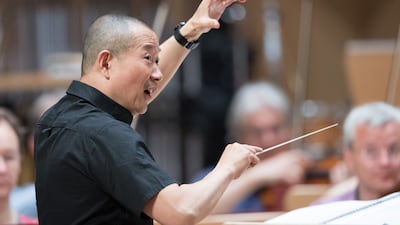Amid the poised and traditional world of classical music, Chinese-American composer Tan Dun is something of a rock star.
He has composed symphonies and operas that have been performed in some of the world’s most renowned venues, from Milan’s La Scala Theatre to New York’s Metropolitan Opera House. He has also contributed the scores to six films, including 2000’s Crouching Tiger, Hidden Dragon, as well as several experimental multimedia projects.
Such breadth has brought him great rewards, including Oscar, Grammy and Bafta awards, as well as the accolade of Composer of Year, bestowed by classical music magazine Musical America.
The Abu Dhabi Festival is next in line to showcase Tan’s evocative work, with the regional premiere of his latest orchestral piece Buddha Passion.
To be performed at Emirates Palace on Saturday and unfolding across six acts, the powerful score will aims to transmit some of the Buddha's concepts of love, forgiveness, sacrifice and salvation.
Conducted by Tan and featuring a large cast including Chinese soprano Lei Xu and tenor Yi Li, as well as Italy's Orchestra Filarmonica del teatro Comunale di Modena, expect an elegiac and shimmering musical backdrop featuring operatic vocals weaved with Buddhist chants and stories.
According to Tan, Buddha Passion is the ideal entry point into his oeuvre as it plays to his strengths.
"I feel this piece was much clearer and easier for me. I have grown as a composer in that I am much more focused on my storytelling,” he told Opera Wire.
“Buddha Passion is in six acts, six mini-operas, and six stories, very slim and clear. Quick and to the point. This kind of storytelling feels closer to stories told in film and less like those at an opera house. This is quite different for me from before.”
The work also marks the evolution of a fascinating journey stretching from the rice fields of Central China to the red carpets of Hollywood.
Tan's early years
Born in 1957 in a village near Changsha in the province of Hunan, Tan's early years were spent in relative comfort with his mother working as a doctor and his father employed at a food research institute.
That lifestyle was upended with Mao Zedong's Cultural Revolution, which began in 1966, and resulted in Tan's relocation to the nearby town of Huangjin in the early 1970s to work as a rice planter.
“Imagine … you were told to report to an office and made to swear to leave your family, to feed pigs, to plant rice, for your entire life,” he told The New York Times.
“I cried. How could I do this for my entire life? In fact, the required length of time depended on the purity of your thoughts.”
Tan’s stay proved to be relatively short lived after Zedong’s death in 1976 marked the end of the revolution.
Opportunity through tragedy
While music was strongly discouraged within the rice-planting communities, Tan learnt to play traditional Chinese string instruments with fellow residents and eventually joined an in-house ensemble.
But the transition from hobby to career came about through a tragic turn of events.
After several members of the Peking Opera drowned in a ferry accident, Tan was hired to work as the troupe's arranger and violinist.
The stint at Peking Opera proved successful and Tan gained the attention of Beijing's Central Conservatory of Music where he was accepted as a student in 1977.
Under the tutelage of composers such as Japan's Toru Takemitsu and Germany's Hans Werner Henze, he developed an expansive knowledge of eastern and western classical music, which he further explored pursuing a doctorate at New York's Columbia University.
Exposed to the works of experimental US composers such as Philip Glass and Meredith Monk, it was in New York that Tan began composing work fusing his signature mystic and abstract elements.
Settling in New York, Tan launched his international career through a series of contemporary operas.
In 1996 he composed Marco Polo, an abstract retelling of the 13th-century Venetian explorer's life, through eastern and western instruments such as the sitar, tabla, Tibetan horn and a string ensemble.
The cinematic quality of the work convinced Taiwanese director Ang Lee that Tan was the ideal composer to score his mystical martial arts film Crouching Tiger, Hidden Dragon.
Performed by a range of Chinese companies including the Shanghai Symphony Orchestra and Shanghai National Orchestra, Tan's score featured numerous solo passages for cello played by Chinese-American cellist Yo-Yo Ma.
While the score's Oscar could have resulted in Tan focusing his efforts in the more lucrative world of Hollywood, he remained circumspect in his choice of film projects.
Crouching Tiger, Hidden Dragon remains his only Hollywood foray, with future scores composed for Chinese films including 2002's martial arts drama Hero and the 2006 period drama The Banquet.
Buddha Passion by Tan Dun will performed at Emirates Palace on Saturday at 8pm. Tickets, starting at Dh75, are available at abudhabifestival.ae


